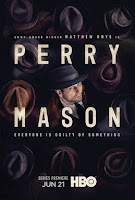by
Scott D. Parker
One of my favorite TV shows ended its five-year run on Tuesday and I’m wondering if it’ll be the last great network show I watch.
New Amsterdam
Like Castle, New Amsterdam had me at the trailer. The show starred Ryan Eggold (whom I knew from The Blacklist) as Max Goodwin, the new medical director at New Amsterdam, the oldest public hospital in America (based on the real Bellevue hospital). Eggold’s performance on The Blacklist stood out, especially when he was in the same show as series star James Spader, but with Max, Eggold had a role to which he could bring his considerable charm and humanity. It didn’t hurt that he had Max’s mantra as a north star: How can I help?
If you watch the trailer, you get what the series was about: helping people despite the massive forces standing in the way. Over five years, and through a pandemic, Max and his colleagues kept running up against seemingly insurmountable odds. Sometimes they’d win, other times they’d lose, but they kept trying, striving to do what they can.
New Amsterdam ran on Tuesday nights on NBC right after the massive hit This is Us. My wife watched that show from the jump and, like many viewers, often ended episodes with tears in her eyes. I didn’t watch that show, but New Amsterdam proved to be my weekly dose of heartwarming tears.
Storytelling-wise, the writers of New Amsterdam often used a very small story—often a single patient—to tell a larger tale. Like all good TV shows, the supporting cast each had their time the spotlight. A particular favorite was Tyler Labine's Iggy Frome, a psychiatrist, who often ran up against the pillars of big medicine just as much as Max did. A season 5 recurring theme for Iggy was the crumbling of his marriage and having to come to terms with himself before reaching out to his ex-husband and asking him for a simple date, to try again.
Sandra Mae Frank's Dr. Elizabeth Wilder was the Chief of Oncology. The actress is also deaf. She became a love interest to Max in the last season and I found it wonderful not only to see how a deaf surgeon navigated the world of the hearing in the operating room but also how the writers showed a burgeoning love often in silence and sign language.
I enjoyed seeing Jocko Sims's chief surgeon come to terms with things he could not easily fix--like his personal life as well the relationship with mostly absent father--and how Jocko imbued Floyd Reynolds with deep grace and understanding. And Janet Montegomery's Lauren Bloom, a character who grappled with addiction and showed how the messiness in life can be dealt with, but that it's hard and it takes one day at a time, one decision at a time, and the struggle never ends.
The writers and directors brought all their resources to bear in fun way, sometimes using time-honored tropes quite effectively. They did so for the finale episode, adding a nice twist that pulled all the tears from my eyes. [I’ll add my thoughts about the finale at the bottom of this post.]
But what really got me thinking about the end of New Amsterdam is what it might signal for me as a viewer: Would this be the last network TV show I watched on a regular basis?
Network TV for Generation X
Born in 1968, I remember when there were three networks, PBS, and a local UHF station here in Houston. By the time I got to middle school, we had two more local stations, but that was it. Every fall, the three networks would roll out their Saturday morning cartoon lineup, showcasing them in specials that aired the previous night. There'd be articles in the local papers for the new fall TV shows (including a side-by-side grid) and big splashes on TV Guide. I remember scanning all those resources and then making a schedule for what I'd want to watch.
This practice pretty much continued through the publication history of Entertainment Weekly and the birth of the internet when information was much easily found. I'm always game to see what the Big 3 had planned.
With the birth and rise of streaming TV, however, things began to change. Netflix would drop every episode of a new show and you could binge them all in a weekend. Other services followed suit. It was a different way to watch TV. Not wrong, mind you, but different. Just because I grew up in the weekly format doesn't mean I don't appreciate having all episodes of a season at my fingertips. Ever since last summer, my family has been watching the entire run of Friends, an episode a day at dinner, something that would have been difficult prior to streaming. But there is something to having a week to think about and digest plot elements and revelations of any given episode. I remember when Lost was airing, the morning after, a group of us would discuss the newest episode over coffee. It was quite fun.
Things change and I change with them. That's how life is, but I will say I dug when Disney+ opted to drop episodes of its Marvel and Star Wars TV shows on a weekly basis. Sure, it meant the company would secure subscriptions for a longer time, but it was fun to think and read about what the latest revelation about Wanda (WandaVision) or The Mandalorian or Andor might mean.
As Fall 2022 approached, I did my usual thing that I've done all my life: I scanned what was returning and what new shows would debut. New Amsterdam was top of my list even though I knew going in it would be its last. And a shortened 13-episode season at that. It was, however, the only returning show I watched and cared about. The only other network show I watched live--SyFy's Resident Alien--wouldn't be returning until 2023.
That left the new shows. As I read about them and watched previews, I experienced something foreign to my experience: none of the shows appealed to me. Granted, I'm a middle-aged guy now so that might be a thing, but you'd think the shows at CBS would be in my wheelhouse. Some of them probably should be. I'm looking at NCIS or FBI, but for whatever reason, I just never started.
The Future of Network TV
So what's next? Network TV is not going away, but perhaps that majority of its viewers are. The Boomers are slowly dying and us Gen Xers are now in middle age. Millennials grew up in the 1980s and 1990s so they remember what it was like to be in front of a TV on Thursday nights (or set the VCR) but for Gen Z, the ones born in the late 1990s, I don't think network TV barely registers. My son, now twenty-one, rarely watched anything on "live" TV after he stopped watching Blue's Clues. His network is YouTube and streaming. When he moved out of the house, I made sure to load the apps of the local TV stations on his smart TV. "It's for the weather at least," I told him. He just showed me his phone. "I get the weather here."
And he gets his TV there, too.
Now that New Amsterdam is gone, network TV is now the place I watch Stephen Colbert every night. And football until the Super Bowl and then golf on Sunday afternoons without football. If you throw in ESPN, it's also the place I'll catch NBA games, but I think you're seeing the trend. Network TV might become the place for live events where scripted TV shows are things I'll catch on a streaming service.
Might network TV have lost a viewer? Unlikely. Come next fall, I'll still read about the new shows. There might be another New Amsterdam, a new This is Us, or a surprise sitcom that comes out of the blue. I will always be curious to see what network TV has to offer.
But it has been a fascinating realization that the end of New Amsterdam likely marks a point in my lifetime of TV watching.
What about you? Do you still watch network TV or are all your favorite shows on a streaming service?
The New Amsterdam Finale with Spoilers
One of the tropes the writers used in the finale was to give each character their origin story via flashbacks. We see how Max, Elizabeth, Iggy, Lauren, and Floyd each found their way into the practice of medicine. I'll add that I kind of hoped for a flashback to Anupam Kher's Dr. Vijay Kapoor but, as my wife suggested, perhaps the show and the actor didn't part well. Ditto on both accounts for Freema Agyeman as Dr. Helen Sharpe, Max's previous love interest.
In one of those tricks via editing, you see Max's last day at New Amsterdam with his young daughter, Luna, as they try and get out of the hospital. Max has resigned the position of Medical Director in order to spend more time with Luna. There is, of course, a major emergency that will harness the powers and abilities of all the staff and it forces Max to miss the mermaid parade yet again (it's something Luna always wants to attend but they kept missing it because of Max's job, thus the resignation).

The editing trick is where you see what is presented as the next medical director, a young woman who showed up and has to deal with whispered rumors about her. Halfway through the show, as Max's edict of "How can I help?" has been uttered more than once, I looked over to my wife and said, "If the final four words of this entire series isn't 'how can I help?', then the writers will have missed a golden opportunity."
They didn't, but they went one better. My wife figure it out first and suggested it: "I think that new medical director is Luna all grown up."
Boom! That is exACTly what it was. Some writer I am. I didn't even see it coming (although, to be fair, I rarely try and guess stories while I'm in the middle of them because in that moment, I'm a viewer/reading rather than a writer).
Turns out, Luna's origin story was Max's last day at New Amsterdam. And it is she, looking directly at the camera, who speaks those famous four words: How can I help? Cut to black and cue the tears.
Oh, and props to the writers for not showing us older versions of the same characters. I first thought I might've wanted to see a gray-haired Max, to see him be proud of his daughter, but then realized my error. And here's the veteran writer tip: you don't have to see Ryan Eggold in old person makeup to know he's proud of his daughter. If you've written characters well, stuff like that is understood and doesn't always have to be shown. Besides, New Amsterdam no longer belonged to Max. It's Luna's story now.













.jpeg)


